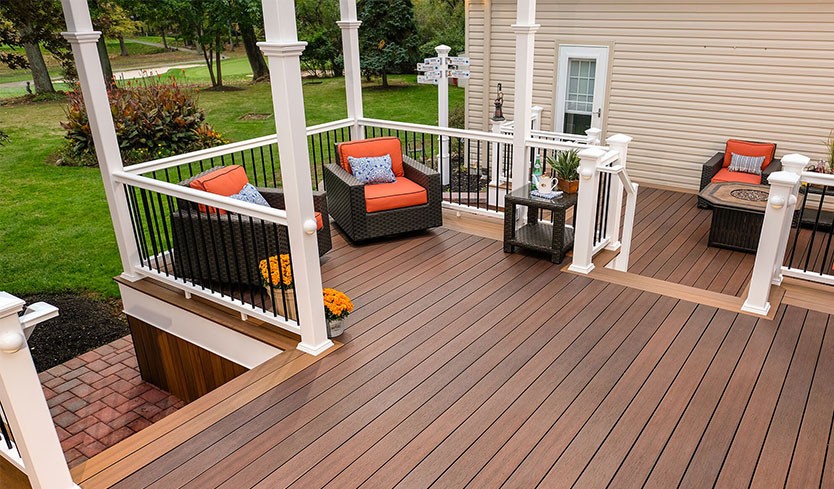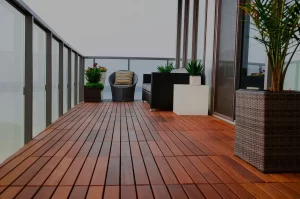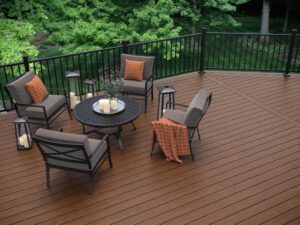When it comes to transforming your outdoor living space, one of the most innovative and practical options in recent years has been the advent of vinyl deck flooring. This modern decking solution has revolutionized the way we approach outdoor design and maintenance. Vinyl deck flooring offers a winning combination of durability, versatility, and aesthetics that can enhance the beauty and functionality of your deck or patio.
In this blog post, we will delve into the world of vinyl deck flooring, exploring its key features, benefits, installation process, design possibilities, and much more. Whether you’re a homeowner looking to revamp your outdoor oasis or a DIY enthusiast seeking a reliable decking material, this guide will provide you with valuable insights to make an informed decision. So, let’s embark on a journey through the realm of vinyl deck flooring and discover why it’s becoming a top choice for modern outdoor spaces.
What is Vinyl Deck Flooring?
- Material Composition: Vinyl deck flooring is primarily made from synthetic materials, often polyvinyl chloride (PVC).
- Durability: It is highly durable and can withstand harsh outdoor conditions, including moisture, UV rays, and mildew, without deteriorating.
- Types: Vinyl deck flooring comes in different forms, including luxury vinyl planks, tiles, and sheet vinyl, each with its own unique advantages.
- Aesthetic Options: Luxury vinyl planks and tiles offer a wide range of design options, mimicking the look of natural wood or stone. This allows for versatile and customizable outdoor designs.
- Low Maintenance: Vinyl deck flooring is known for its minimal maintenance requirements. It resists staining, fading, and warping, eliminating the need for regular refinishing or sealing.
- Waterproof: Sheet vinyl, in particular, provides a seamless and waterproof surface, making it ideal for areas where moisture is a concern.
- Installation: The installation process is relatively straightforward, making it suitable for DIY projects. Proper subfloor preparation is essential for a successful installation.
- Longevity: Vinyl deck flooring is designed for long-term use, and many manufacturers offer warranties to ensure its performance over the years.
- Low Environmental Impact: Some vinyl deck flooring products are eco-friendly, with options made from recycled materials and recyclable components.
- Popular Choice: Its combination of durability, low maintenance, and aesthetic appeal has made vinyl deck flooring a popular choice for modern outdoor spaces.
- Versatility: Whether you’re renovating an existing deck or building a new one, vinyl deck flooring provides a versatile and reliable decking solution.
These points summarize the key characteristics and benefits of vinyl deck flooring, making it a compelling option for homeowners and builders seeking a resilient and attractive outdoor flooring solution.
Types of Vinyl Deck Flooring
Luxury Vinyl Planks (LVP):
Resemble the appearance of natural wood planks, complete with wood-grain textures and realistic colors.
Available in various plank sizes and styles to mimic different wood species.
Easy to install with click-and-lock or adhesive methods.
Provides a high-end, authentic wood look without the maintenance requirements of real wood.
Vinyl Deck Tiles:
Typically square or rectangular pieces that interlock to cover the deck surface.
Come in a variety of styles, including wood, stone, and contemporary designs.
Offer a modular and DIY-friendly installation process.
Ideal for adding design accents or covering smaller deck areas.
Sheet Vinyl Decking:
Comes in large, continuous rolls, providing a seamless, waterproof surface.
Excellent for covering larger deck areas efficiently.
Suitable for decks that require complete waterproofing, such as rooftop decks.
Installed using adhesive, heat-welding, or other specialized methods to ensure a watertight seal.
Composite Vinyl Decking:
Combines the benefits of vinyl and composite materials.
Features a vinyl surface layer for durability and a composite core for added strength and stability.
Resists staining, fading, and mold growth.
Offers a balance between the natural look of wood and the low maintenance of vinyl.
Textured Vinyl Decking:
Designed with textured surfaces for improved slip resistance, making them ideal for wet or high-traffic areas.
Often used around pools or in regions with rainy or humid climates.
Available in various colors and patterns to suit different design preferences.
Capped Vinyl Decking:
Features an additional protective layer (cap) on the surface to enhance durability and resistance to scratches and stains.
Provides superior UV protection to prevent fading and discoloration.
Requires minimal maintenance and cleaning.
Embossed Vinyl Decking:
Includes surface textures or patterns that add depth and dimension to the deck’s appearance.
Popular choices include wood-grain embossing for a realistic wood look.
The embossing can enhance both aesthetics and traction.
These different types of vinyl deck flooring offer a range of options to suit various preferences, budgets, and project requirements. Whether you’re aiming for a natural wood appearance, maximum durability, or specialized features like waterproofing or slip resistance, there’s a vinyl deck flooring type that can meet your needs.
Advantages and Disadvantages of Vinyl Flooring
Advantages of Vinyl Flooring:
Affordability: Vinyl flooring is generally more budget-friendly than many other flooring options, including hardwood, stone, and ceramic tiles.
Durability: It is highly resilient and can withstand heavy foot traffic, making it ideal for high-traffic areas in homes and commercial spaces.
Variety of Designs: Vinyl flooring comes in a wide range of styles, colors, and patterns, including options that mimic the appearance of natural materials like wood, stone, and tile.
Low Maintenance: Vinyl is easy to clean and maintain. Regular sweeping and occasional mopping are usually sufficient to keep it looking good.
Water Resistance: Most vinyl flooring is water-resistant or waterproof, making it suitable for bathrooms, kitchens, and other areas prone to moisture.
Comfort Underfoot: Vinyl flooring is softer and warmer underfoot compared to materials like tile or concrete.
DIY Installation: Many vinyl flooring options are designed for easy DIY installation, reducing installation costs.
Stain Resistance: Vinyl is generally resistant to stains from common household substances, making it a practical choice for families.
Noise Reduction: Some vinyl flooring options include a built-in underlayment or backing that helps reduce noise levels.
Eco-Friendly Options: There are eco-friendly vinyl flooring products made from recycled materials or using environmentally responsible manufacturing processes.
Disadvantages of Vinyl Flooring:
Not Eco-Friendly: While there are eco-friendly options, conventional vinyl flooring is not biodegradable and can be harmful to the environment when disposed of improperly.
Vulnerable to Sharp Objects: Sharp objects or heavy furniture can puncture or damage vinyl flooring, especially in low-quality products.
Limited Repairability: When vinyl flooring is damaged, it can be challenging to repair. In most cases, the damaged section needs to be replaced.
Can Fade: Vinyl flooring may fade over time, especially in areas exposed to direct sunlight.
Susceptible to Scratches: While it’s generally resistant to staining, vinyl flooring can be susceptible to scratches from sharp objects or heavy furniture.
Off-Gassing: Some vinyl flooring products may emit volatile organic compounds (VOCs) and odors, especially when new. Proper ventilation is important during and after installation.
Not as Luxurious as Natural Materials: While vinyl can mimic the look of natural materials, it may not have the same luxurious feel or visual depth as the real thing.
Temperature Sensitivity: Extreme temperature changes can affect the stability of vinyl flooring, causing it to expand or contract.
Lifespan: While durable, vinyl flooring may not have the same lifespan as natural materials like hardwood or stone.
Subfloor Preparation: For the best results, vinyl flooring requires a smooth and level subfloor, which may necessitate additional preparation costs.
In summary, vinyl flooring offers many advantages, including affordability, durability, and a wide range of design options. However, it also has some disadvantages, such as vulnerability to sharp objects and environmental concerns. Choosing vinyl flooring should be based on your specific needs, budget, and priorities for your space.
Conclusion
In conclusion, vinyl flooring is a versatile and practical choice for homeowners and businesses alike. Its numerous advantages, such as affordability, durability, and a wide variety of designs, make it a popular flooring option in today’s market. Whether you’re seeking a cost-effective solution for high-traffic areas or aiming to replicate the look of natural materials like wood and stone, vinyl flooring offers a range of options to suit your needs.
The low maintenance requirements of vinyl flooring make it an attractive choice for those with busy lifestyles. Its resistance to stains, water, and wear-and-tear ensures that it can withstand the rigors of daily life, making it an ideal choice for kitchens, bathrooms, and family rooms.
However, it’s essential to consider the potential drawbacks of vinyl flooring, such as its environmental impact and susceptibility to damage from sharp objects. Buyers should also be cautious of off-gassing when choosing vinyl products and ensure proper ventilation during and after installation.
Ultimately, the decision to install vinyl flooring should be based on your specific preferences, budget, and the demands of your space. Whether you’re looking for an affordable and stylish flooring solution for your home or a resilient option for a commercial setting, vinyl flooring has proven itself to be a viable and attractive choice for modern flooring needs.





